- Home
- Iris Murdoch
The Bell Page 3
The Bell Read online
Page 3
She saw more of Noel Spens and his circle of easy-going hard-drinking friends. She began to develop, in ways very different from what she had once intended, a certain sophistication. At home, Paul flayed her with reproaches which she knew to be just. She tried to explain to him why she was unhappy, but she was incoherent and he exasperated. Paul knew exactly what he wanted. He told her, ‘I want to do my work and be married to you. I want to fill your life as you fill mine.’ She felt herself brow-beaten by the energy of his purpose and humiliated by his refusal to understand her complaints. As she was unused to judging others with precision or analysing them in her thoughts she could neither satisfy Paul nor defend herself. At last, obeying that conception of fatality which served her instead of a moral sense, she left him.
She went at first to her mother, with whom she soon quarrelled. When Paul was convinced that she had really gone he sent her a meticulous and characteristic letter. ‘You realize I have no legal obligations. But I have arranged for forty pounds a month to be paid into your bank account until such time as you come to your senses and return to me. I don’t want you to live in penury. On the other hand, you can hardly expect me to support you lavishly in a state of demoralized and brutish debauch, and shortly no doubt in adultery. You are fortunate to be able to know that my love for you remains unaltered.’ Dora decided to refuse the money but accepted it. She moved into a room in Chelsea. It was not long before she began to have a love affair with Noel Spens.
When Dora first escaped from Knightsbridge and from the routine of evening bickering with Paul she felt intense relief. But she soon realized she had no other life to escape into. She became vaguely dependent on Noel Spens, who turned out to be a gentle and considerate person. Noel said to her, ‘Darling, come live with me and be my love, on condition that you keep it in mind that I am the most frivolous man in the world.’ Dora knew he said this just to calm her nerves, but she was grateful all the same, and her nerves were calmed. She lived in an atmosphere of factitious and self-conscious frivolity, picturing herself as an irresponsible Bohemian. That she had deeply hurt Paul she tried not to remember. Memory was something for which Dora had little use. But she was too conventional a person not to feel painfully guilty and embarrassed at her situation. She struggled to recapture her gaiety. She began to feel frightened that Paul would come and drag her back violently or make a scene with Noel. Paul did not in fact pursue her, but wrote her regular weekly letters of reproach. She felt in these letters, with a certain despair, the demonic energy of his will bent always upon her. She knew he would never give her up. She passed the summer drinking and dancing and making love and spending Paul’s allowance on multi-coloured skirts and sandals and jazz records. Then in early September she decided to go back to him.
Paul had been in the country since July. He was working, he told her, in one of his letters which she had never answered, on some fourteenth-century manuscripts of enormous interest which belonged to an Anglican convent in Gloucestershire. He was the guest of a lay religious community which lived beside the convent. It was a beautiful place. Dora who, though touched by his faithfulness, just glanced his letters quickly through to see if they contained threats and tore them up at once so as not to have to see his handwriting any longer, had gathered very little about where he was except the name. The convent was called Imber Abbey, and the house where Paul was staying was called Imber Court. So it was to this address that Dora wrote her laborious letter, half penitent and half aggrieved, to announce that she was proposing to return to her husband.
She received by return of post from Paul a cold and businesslike note saying that he would expect her on Tuesday, she should catch the 4.56 stopping train from Paddington and would be met by car at Pendelcote. He enclosed the key of the flat, in case she had lost hers. Would she kindly bring his Italian sun hat and dark glasses, and also the blue note-book which she would find in the top drawer of his desk. Dora, who had been moved by her own letter, felt that not enough was being made of the occasion. She had expected Paul to come running up to London to receive her. She had not expected to be summoned curtly into the country. Alarm overtook her too at the thought of meeting Paul again in such strange surroundings. What, in any case, was a lay religious community? Dora’s ignorance of religion, as of most things, was formidable. She had never in fact been able to distinguish religion from superstition, and had given up her own practice of it when she discovered that she could say the Lord’s Prayer quickly but not slowly. She lost such faith as she had without pain and had not had occasion to re-consider the matter. She wondered if Paul took part in the religion down there. They had been married very grandly, though amid some ironic glances from Paul’s friends, in church. For Paul had followed his father and grandfather in wishing to anglicize himself as much as possible where matters of class and religion were concerned. It had taken Dora some time to realize this, and when she had done so it increased for her the unreality of their relationship. Moreover the contempt of Paul as a Christian was even harder to bear than his contempt as a savant, since that aspect of him was for poor Dora even less penetrable. Did Paul believe in God? Dora did not know. As her thoughts now conjured up the reality of Paul and as her imagination played at last upon the fact that he had really existed all through this strange interval, and had continued his life, thinking about her and judging her, her heart sank utterly. She decided not to go.
She returned to her former resolve after discussions with Sally, who disliked Noel, and had always been, Dora suspected, rather sweet on Paul, and with Noel, who was by now thoroughly worried about Dora’s state of mind and about what was to be done with her. Dora fetched the things from Knightsbridge, with a fast-beating heart as she opened the door of the flat and saw the familiar accusing scene, florid and unchanged, except for the dust and the smell of absence. She collected some of her own clothes at the same time. Her flight had been not totally unpremeditated but quite unorganized. By the time Tuesday came, fear of seeing Paul again overwhelmed all other emotions. She cried all the way to Paddington in Noel’s car.
It was a relentlessly hot day. They arrived in good time for the 4.56 but the train was already in the station and fairly full. Noel found her a corner seat on the corridor side and lifted her large case onto the rack, placing on top of it the paper bag containing Paul’s Italian straw sun hat. Dora dropped her smaller canvas bag on the seat and got out on to the platform with Noel. They looked at each other.
‘Don’t stay,’ said Dora.
‘Your teeth are chattering,’ said Noel. ‘At least I assume that’s what they’re doing. I’ve never witnessed this phenomenon before. ’
‘Oh, shut up!’ said Dora.
‘Cheer up, darling,’ said Noel. ‘You look the picture of misery. After all, if you hate it you can come away. You’re a free agent.’
‘Am I?’ said Dora. ‘All right, all right, I’ve got a handkerchief. Now please go.’
They stood holding hands. Noel was a very big man with a pale unwrinkled face and pale colourless hair. With his look of gentle awkward bland amiability he was like a large teddy bear. He smiled down upon Dora, wanting to be sympathetic without humouring her mood. ‘Write to Uncle Noel, won’t you?’
‘If I can,’ said Dora.
‘Come, come,’ said Noel. ‘Don’t be tragic. Above all, don’t let those people make you feel guilty. No good ever comes of that.’ He put his hands under her elbows and lifted her for a moment off the ground. They kissed. ‘Give my love to Paul!’
‘Hell. Goodbye.’
Dora got into the train. It was now very full indeed and people were sitting four a side. Before she sat down she inspected herself quickly in the mirror. In spite of all her awful experiences she looked good. She had a round well-formed face and a large mouth that liked to smile. Her eyes were a dark slaty blue and rather long and large. Art had darkened but not thinned her vigorous triangular eyebrows. Her hair was golden brown and grew in long flat strips down the side of her head, like fern
s growing down a rock. This was attractive. Her figure was by no means what it had been.
She turned towards her seat. A large elderly lady shifted a little to make room. Feeling fat and hot in the smart featureless coat and skirt which she had not worn since the spring, Dora squeezed herself in. She hated the sensation of another human being wedged against her side. Her skirt was very tight. Her high-heeled shoes were tight too. She could feel her own perspiration and was beginning to smell that of others. It was a devilish hot day. She reflected all the same that she was lucky to have a seat, and with a certain satisfaction watched the corridor fill up with people who had no seats.
Another elderly lady, struggling though the crush, reached the door of Dora’s carriage and addressed her neighbour. ‘Ah, there you are, dear, I thought you were nearer the front.’ They looked at each other rather gloomily, the standing lady leaning at an angle through the doorway, her feet trapped in a heap of luggage. They began a conversation about how they had never seen the train so full.
Dora stopped listening because a dreadful thought had struck her. She ought to give up her seat. She rejected the thought, but it came back. There was no doubt about it. The elderly lady who was standing looked very frail indeed, and it was only proper that Dora, who was young and healthy should give her seat to the lady who could then sit next to her friend. Dora felt the blood rushing to her face. She sat still and considered the matter. There was no point in being hasty. It was possible of course that while clearly admitting that she ought to give up her seat she might nevertheless simply not do so out of pure selfishness. This would in some ways be a better situation than what would have been the case if it had simply not occurred to her at all that she ought to give up her seat. On the other side of the seated lady a man was sitting. He was reading his newspaper and did not seem to be thinking about his duty. Perhaps if Dora waited it would occur to the man to give his seat to the other lady? Unlikely. Dora examined the other inhabitants of the carriage. None of them looked in the least uneasy. Their faces, if not already buried in books, reflected the selfish glee which had probably been on her own a moment since as she watched the crowd in the corridor. There was another aspect to the matter. She had taken the trouble to arrive early, and surely ought to be rewarded for this. Though perhaps the two ladies had arrived as early as they could? There was no knowing. But in any case there was an elementary justice in the first comers having the seats. The old lady would be perfectly all right in the corridor. The corridor was full of old ladies anyway, and no one else seemed bothered by this, least of all the old ladies themselves! Dora hated pointless sacrifices. She was tired after her recent emotions and deserved a rest. Besides, it would never do to arrive at her destination exhausted. She regarded her state of distress as completely neurotic. She decided not to give up her seat.
She got up and said to the standing lady ‘Do sit down here, please. I’m not going very far, and I’d much rather stand anyway.’
‘How very kind of you!’ said the standing lady. ‘Now I can sit next to my friend. I have a seat of my own further down, you know. Perhaps we can just exchange seats? Do let me help you to move your luggage.’
Dora glowed with delight. What is sweeter than the unhoped-for reward for the virtuous act?
She began to struggle along the corridor with the big suitcase, while the elderly lady followed with the canvas bag and Paul’s hat. It was difficult to get along, and Paul’s hat didn’t seem to be doing too well. The train began to move.
When they reached the other carriage it turned out that the lady had a corner seat by the window. Dora’s cup was running over. The lady, who had very little luggage, departed and Dora was able to install herself at once.
‘Let me help you,’ said a tall sunburnt man who was sitting opposite. He hoisted the big case easily on to the rack, and Dora threw Paul’s hat up after it. The man smiled in a friendly way. They sat down. Everyone in this carriage was thinner.
Dora closed her eyes and remembered her fear. She was returning, and deliberately, into the power of someone whose conception of her life excluded or condemned her deepest urges and who now had good reason to judge her wicked. That was marriage, thought Dora; to be enclosed in the aims of another. That she had any power over Paul never occurred to her. It remained that her marriage to Paul was a fact, and one of the few facts that remained in her disordered existence quite certain. She felt near to tears and tried to think of something else.
The train was thundering through Maidenhead. Dora wished she had got her book out of her suitcase before the train started. She felt too shy to disturb her neighbour by doing so now. Anyway, the book was at the bottom of the case and the whisky bottles on the top, so the situation was best left alone. She began to study the other people in the carriage. Some nondescript grey ladies, an elderly man, and opposite to her, two younger men. Or rather, a man and a boy. The boy, who was sitting by the window, must be about eighteen, and the man, who was the one who had helped her with her luggage, about forty. These two appeared to be travelling together. They were a good-looking pair. The man was large and broad-shouldered, but a little gaunt and drawn in the face underneath his sunburn. He had an open friendly expression and a wide forehead crossed by rows of regular lines. He had plenty of curly dark brown hair, going grey in places. His heavily veined hands were lightly clasped on his knee, and his gaze shifted easily along the row of passengers opposite, appraising each without embarrassment. He had the sort of face which can look full of amiability without smiling, and the sort of eyes which can meet the eyes of a stranger and even linger, without seeming aggressive, or seductive, or even curious. In spite of the heat of the day he was dressed in heavy country tweeds. He wiped his perspiring forehead with a clean handkerchief. Dora struggled out of her coat and thrust a hand surreptitiously into her blouse to feel the perspiration collecting between her breasts. She transferred her attention to the boy.
The boy sat in an attitude of very slightly self-conscious grace, one long leg stretched out and almost touching Dora’s. He wore dark grey flannels and a white open-necked shirt. He had thrown his jacket into the rack above. His sleeves were rolled up and his bare arm lay in the sun along the dusty ledge of the window. He was less weather-beaten than his companion but the recent sunshine had burnt his two cheeks to a dusky red. He had an extremely round head with dark brown eyes, and his dry hair, of a dull chestnut colour, which he kept a little long, fell in a shell-like curve and ended in a clean line about his neck. He was very slim and wore the wide-eyed insolent look of the happy person.
Dora recognized that look out of her own past as she contemplated the boy, confident, unmarked, and glowing with health, his riches still in store. Youth is a marvellous garment. How misplaced is the sympathy lavished on adolescents. There is a yet more difficult age which comes later, when one has less to hope for and less ability to change, when one has cast the die and has to settle into a chosen life without the consolations of habit or the wisdom of maturity, when, as in her own case, one ceases to be une jeune fille un peu folle, and becomes merely a woman, worst of all, a wife. The very young have their troubles, but they have at least a part to play, the part of being very young.
The pair opposite were talking, and Dora listened idly to their conversation.
‘Must keep at your books, of course,’ said the man. ‘Mustn’t let your maths get rusty before October.’
‘I’ll try,’ said the boy. He behaved a little sheepishly to his companion. Dora wondered if they could be father and son, and decided that they were more likely to be master and pupil. There was something pedagogic about the older man.
‘What an adventure for you young people,’ said the man, ‘going up to Oxford! I bet you’re excited?’
‘Oh, yes,’ said the boy. He answered quietly, a little nervous of a conversation in public. His companion had a loud booming voice and no one else was talking.
‘I don’t mind telling you, Toby, I envy you,’ said the man. ‘I didn’
t take that chance myself and I’ve regretted it all my life. At your age all I knew about was sailing boats!’
Toby, thought Dora. Toby Roundhead.
‘Awfully lucky,’ mumbled the boy.
Toby is trying to please his master, thought Dora. She took the last cigarette from her packet, and having peered inside several times to make sure that it was empty, threw the packet, after some indecision, out of the window, and caught a look of disapproval, immediately suppressed, on the face of the man opposite. She fumbled to tuck her blouse back into the top of her skirt. The afternoon seemed to be getting hotter.
‘And what a splendid subject!’ said the man. ‘If you’re an engineer you’ve got an honest trade that you can take with you anywhere in the world. It’s the curse of modern life that people don’t have real trades any more. A man is his work. In the old days we were all butchers and bakers and candlestick-makers, weren’t we?’
‘Yes,’ said Toby. For some time now he had been conscious of Dora’s stare. An anxious smile came and went upon his prominent and, it occurred to Dora, admirably red lips. He moved his leg nervously and his foot touched hers. He jerked back and tucked his feet under the seat. Dora was amused.
‘That’s one of the things we stand for,’ said the man. ‘To bring dignity and significance back into life through work. Too many people hate their work nowadays. That’s why arts and crafts are so important. Even hobbies are important. Have you any hobbies?’

 Jackson's Dilemma
Jackson's Dilemma The Flight From the Enchanter
The Flight From the Enchanter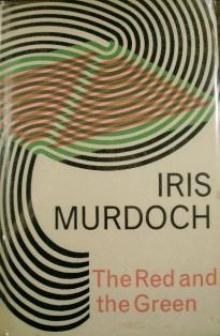 The Red and the Green (Vintage Classics)
The Red and the Green (Vintage Classics) A Severed Head
A Severed Head The Black Prince
The Black Prince The Nice and the Good
The Nice and the Good The Unicorn
The Unicorn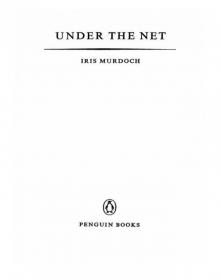 Under the Net
Under the Net The Italian Girl
The Italian Girl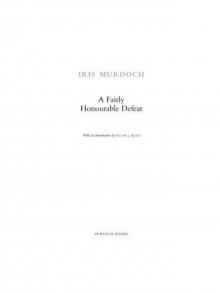 A Fairly Honourable Defeat
A Fairly Honourable Defeat An Accidental Man
An Accidental Man A Word Child
A Word Child The Philosopher's Pupil
The Philosopher's Pupil The Book and the Brotherhood
The Book and the Brotherhood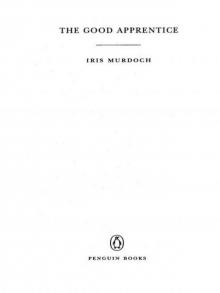 The Good Apprentice
The Good Apprentice The Sacred and Profane Love Machine
The Sacred and Profane Love Machine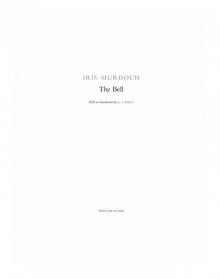 The Bell
The Bell Henry and Cato
Henry and Cato Metaphysics as a Guide to Morals
Metaphysics as a Guide to Morals The Time of the Angels
The Time of the Angels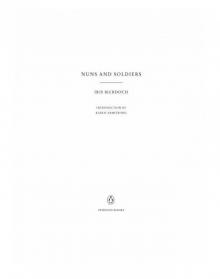 Nuns and Soldiers
Nuns and Soldiers The Green Knight
The Green Knight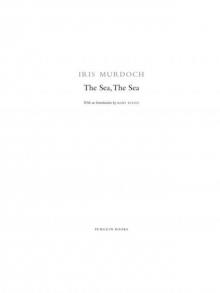 The Sea, the Sea
The Sea, the Sea Sartre: Romantic Rationalist
Sartre: Romantic Rationalist Bruno's Dream
Bruno's Dream An Unofficial rose
An Unofficial rose Sartre
Sartre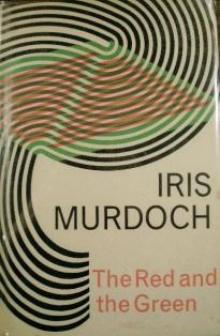 The Red and The Green
The Red and The Green